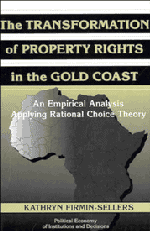 The Transformation of Property Rights in the Gold Coast
The Transformation of Property Rights in the Gold Coast Book contents
PART I - THE INSTITUTIONS OF THE COLONIAL STATE
Published online by Cambridge University Press: 08 January 2010
Summary
The imposition of colonial rule and the coincident appreciation in land values transformed political and economic life in West Africa. The rise in land values prompted European and indigenous actors alike to work to redefine customary land tenure. The institutions of colonial rule influenced the type of property rights systems that these actors defended, and determined the actors' capacity to enforce those rights at the state or local level.
I begin my analysis of these complex events with an examination of British colonialism. The study of British colonialism highlights one of the central themes of chapter I: the need for a more realistic vision of the state. Specifically, the study suggests that any theory of the state must account for the impact of information asymmetries on the state ruler's capacity to enforce property rights or achieve other goals.
The ruler of any state, from the most benevolent to the most predatory, needs information in order to govern. Governance requires a ruler (acting alone or on behalf of her constituency) to target a number of goals, and devise policies to achieve those goals. In the abstract, however, any number of policies are feasible. Consequently, the ruler needs information that allows her to situate each policy choice within a specific context and thus link that choice to a policy outcome.
A simple example illustrates the logic. Assume that a ruler wants to collect the most revenue at the least possible cost.
- Type
- Chapter
- Information
- The Transformation of Property Rights in the Gold CoastAn Empirical Study Applying Rational Choice Theory, pp. 19 - 20Publisher: Cambridge University PressPrint publication year: 1996
